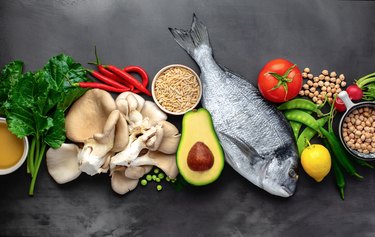
You may have heard that you can fight the Epstein-Barr virus (EBV) naturally with a special diet (for example, one that contains coconut oil or extra vitamins). Some reports also suggest certain foods might "feed" EBV. So what's fact and what's fiction about this virus and your diet?
According to Whitney Linsenmeyer, PhD, RD, assistant professor of nutrition at Saint Louis University in Missouri, there is no specific diet designed to treat an Epstein-Barr infection.
Video of the Day
Video of the Day
Read more: What Can I Eat to Help Fight Infection?
EBV and Diet: The Facts
"You can generally support your immune system and ability to fight off infection with a nutrient-rich diet," Linsenmeyer says.
Most people are infected with Epstein-Barr virus in early childhood, according to the Centers for Disease Control and Prevention (CDC), while 90 percent of adults have been infected by age 35. In some cases, often in older children or young adults, EBV infection causes a flu-like illness called mononucleosis, or "mono." Most people with mono get better in 2 to 4 weeks, but some people may continue to feel exhausted for several weeks to six months or more. Symptoms may include:
- Sore throat
- Swollen glands
- Swollen liver
- Inflamed spleen
- Rash
- Extreme fatigue
"When people talk about a diet to help Epstein-Barr virus, they often mean eating to help beat chronic fatigue, which may have been triggered by the virus," Linsenmeyer says.
Diet for Active EBV Infection
To support your immune system when you are unwell with an EBV infection, Linsenmeyer recommends choosing a variety of foods from each of these food groups every day:
- Whole grains
- Vegetables
- Fruits
- Lean protein
- Dairy
Keeping up your fluid intake with options such as water, herbal tea and broth-based soups is also important, Linsenmeyer says. However, the University of Michigan advises staying away from too much caffeine; non-caffeinated fluids (so, no coffee) are best to avoid dehydration.
Linsenmeyer adds that common symptoms of mono (like fatigue and a sore throat) may affect your appetite, motivation to prepare meals or ability to tolerate certain foods. "For those with a sore throat and little energy to cook, a smoothie made with frozen fruits, vegetables, 100 percent fruit juice and plain yogurt may be well-tolerated," she suggests.
The fatigue you may feel during or following an EBV infection can leave you with little energy to shop for and prep nutritious meals.
"Aim to prepare just one or two nutritious meals that can reheat well throughout the week as leftovers, such as a hearty soup or vegetable lasagna," Linsenmeyer says. "But don't feel badly about having a few healthy takeout options on speed dial."
It's also a good idea to have healthy, easy snacks on hand, such as whole pieces of fruit, nuts or hard-boiled eggs, according to Linsenmeyer.
To be completely clear, it's a myth that eggs "feed" the Epstein-Barr virus. "There is no evidence that eggs exacerbate EBV," Linsenmeyer says. "Rather, eggs are rich in protein and other micronutrients that can support the body's immunity."
Can Supplements Help?
A May 2014 study in Medical Science Monitor found that a high intravenous dose of vitamin C lowered EBV antibody levels (EA IgG) in people with elevated EBV. The authors note this may have an effect on disease course.
But Linsenmeyer says overall there's no good evidence that any supplemental or intravenous nutrients can reduce the risk or severity of EBV. "In general, nutrients to support a healthy and functioning immune system include beta carotene, vitamin C, vitamin D, vitamin E and zinc, as well as the essential fatty acids (omega-3 and omega-6), but they are best from food."
Supplementing your diet with coconut oil has also been touted as a way to fight off EBV, but again, there's no good evidence that it has any effect, Linsenmeyer says.
- Whitney Linsenmeyer, PhD, RD, LD, assistant professor of nutrition, Saint Louis University, Missouri; spokesperson for the Academy of Nutrition and Dietetics
- Centers for Disease Control and Prevention: “About Epstein-Barr Virus (EBV)”
- University of Michigan: “Infectious Mononucleosis”
- Medical Science Monitor: “Effect of High Dose Vitamin C on Epstein-Barr Viral Infection”
Is this an emergency? If you are experiencing serious medical symptoms, please see the National Library of Medicine’s list of signs you need emergency medical attention or call 911.